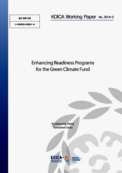Enhancing Readiness Programs for the Green Climate Fund

Developing countries are more vulnerable to climate change and more exposed to serious risks than developed countries. The Green Climate Fund (GCF) was established in 2011 under the agreement of the 16th Session of the Conference of the Parties (COP16) in order to respond to the need of developing countries in reducing or mitigating their greenhouse gas emissions and adapting themselves to the impacts of climate change. The GCF enables the governments of developing countries to obtain direct access to the Fund without intermediaries, but it demands the task of meeting fiduciary standards as well as environmental and social safeguards. In order to support developing countries to meet the standards, the GCF has developed a “readiness program.” This paper examines the readiness program and the needs of the recipient countries, focusing on identifying the gap between the two. Based on the findings, authors suggest five policy recommendations towards the effective operation of the GCF.
The paper has identified the following gaps between the GCF “readiness program” and the needs of the recipient countries. Firstly, the readiness program does not provide sufficient support for actual mobilization when a major concern in developing countries is the mobilization of finance for climate change actions. Secondly, the readiness program mainly focuses on public institutions rather than private sector even though the role of private sector is important in climate change actions. Thirdly, the experiences and lessons learned by recipient countries in receiving financial assistance for their development projects are not fully reflected in the readiness program, and the difference between development finance and that of GCF is not considered sufficiently. Lastly, the problem of absorptive capacity of the Least Developed Countries (LDCs) and Small Island Developing States (SIDs) is not taken into full account. The authors also point out that the GCF’s fiduciary standards are more stringent in comparison to other climate funds, which may requires additional support for developing countries to meet the standards.
Based on the above findings, the following policy actions are suggested by the authors towards the effective operation of the GCF.
(i) Readiness programs should focus more on the fulfillment of the Fiduciary Standards of the GCF.
(ii) Readiness programs should be extended to not only public institutions, but also the private sector.
(iii) Experience and the lessons learned in the development field should be employed. The approaches represented by the Paris Declaration on Aid Effectiveness provide lessons applicable to the operation of the GCF.
(iv) For developing countries that are vulnerable to climate change but do not have appropriate candidates for implementing entities, access to the GCF through international financial institutions, such as the International Development Finance Club (IDFC) member institutions, should be included in addition to Multilateral Development Banks (MDBs) and UN agencies.
(v) Readiness programs should contribute not only to the development of capacity for candidate implementing entities, but also to the indirect improvement of the economic and financial environment of the countries.
The research paper has been published as a KOICA Working Paper No. 2014-3.
scroll